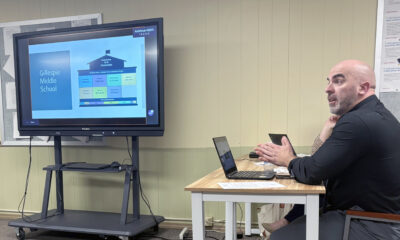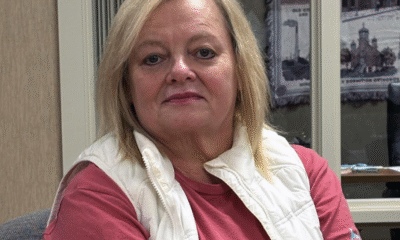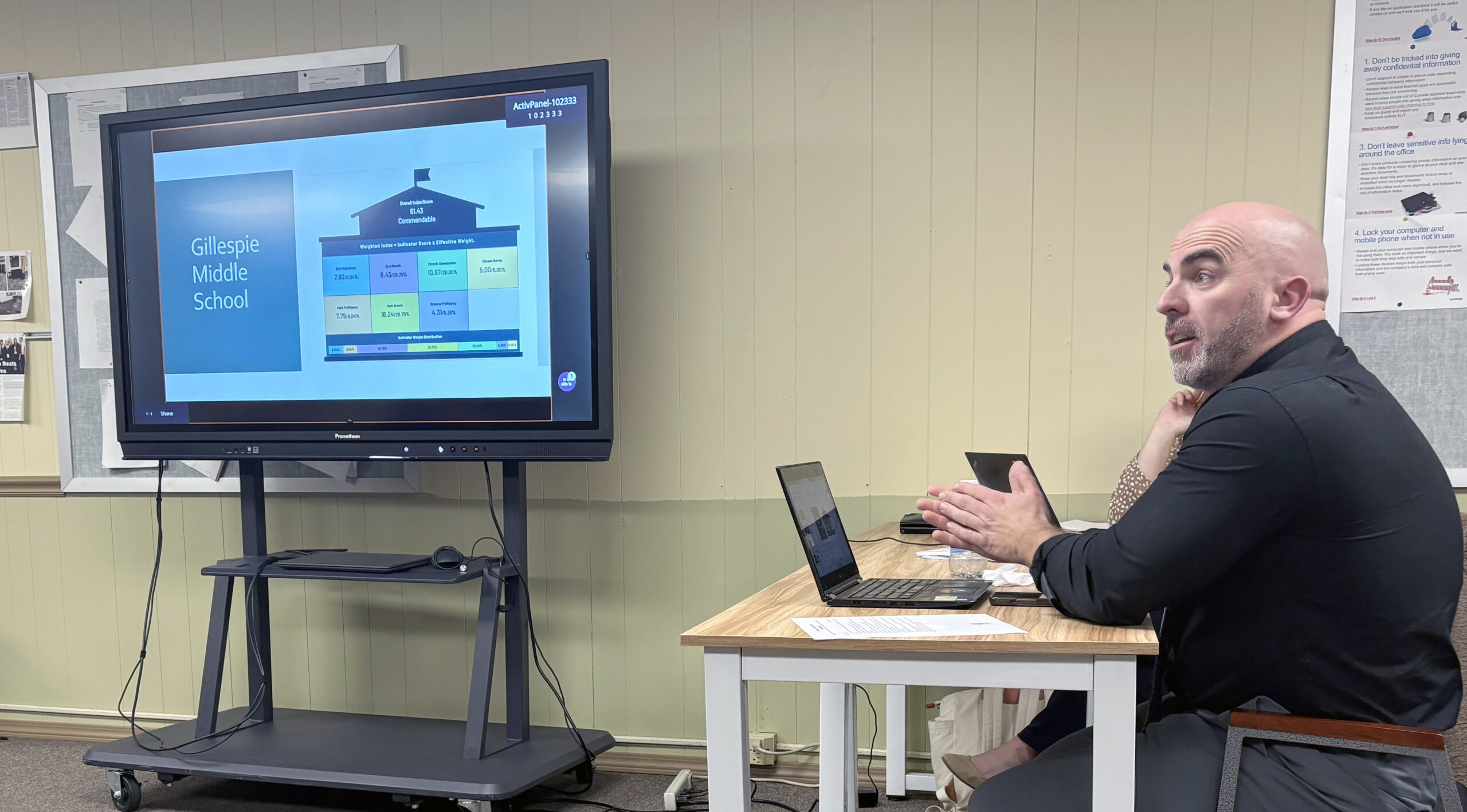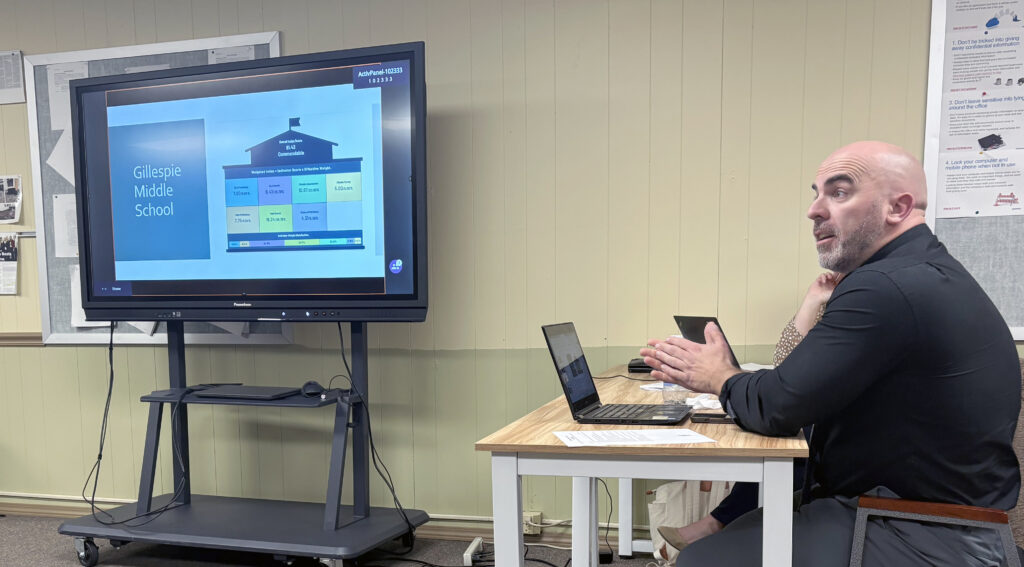Community News
School Board votes to return to remote learning
Published
5 years agoon
By
Dave A

With half of its members participating remotely via the Zoom remote conferencing platform, the Community Unit School District 7 Board of Education on Monday night set a public hearing for the 2020 property tax levy, reviewed this year’s “school report cards” and voted unanimously to return to remote learning, effective Nov. 30, due to an increasing number of COVID-19 infections in the school district and throughout Macoupin County.
The measure to return to remote learning was approved on a motion by Jenni Alepra, seconded by Board President Mark Hayes. Supt. Shane Owsley said remote learning will continue through at least Jan. 11 when students typically would be returning from winter break. The district started the year on Aug. 17 with remote learning only, but the board later agreed to move to a hybrid program—allowing parents to opt for either in-person or remote learning—starting Oct. 4. The move comes only seven weeks after the board agreed to offer a hybrid learning program starting on Oct. 5. Late last month, building administrators reported to the board that about 30 percent of the district’s total enrollment opted for in-classroom learning.
Reading from a prepared letter to be sent to parents, Owsley said the measure is necessary in view of the increasing number of COVID-19 cases.
“The decision to take this step back was not made lightly,” Owsley read. “We have done our best to keep instruction on an in-person basis as long as we possibly could. We know how difficult remote learning is for students, parents, and teachers. We also understand that many families and teachers have been resistant to shifting away from in-person, and we fully understand that sentiment. However, we feel strongly that at this time the right thing to do is to shift into Full Remote instruction.”
Additionally, he said eliminating in-person learning through Jan. 11 will get the district through the holidays when some local families are likely to be traveling, attending holiday gatherings, and otherwise increasing their chances of exposure to the COVID-19 virus.
“We understand this and we are not making any judgments on those decisions,” Owsley read from his letter. “However, this does pose a significantly increased risk to students and staff when we are conducting in-person instruction. That, along with the unrelenting increase of COVID cases, leaves us with no choice but to make this move at this time. By going Full Remote for the next four academic weeks we will be able to get through and well past the Holiday Season. This will give us a chance to reassess how things are in our communities and our area the first week of January and determine if a shift back to our Hybrid Learning Plan is in order at that time.”
Earlier in the meeting, anticipating the board’s vote to suspend in-classroom learning, Michelle Smith, President of the local teachers union, read a statement thanking the board for its action and emphasizing that a return to remote learning would be in the “best interest of the health and safety of CUSD 7 students, teachers and staff.”
TAX LEVY
On Owsley’s recommendation, the board approved a resolution setting a Truth in Taxation hearing for 6 p.m., Monday, Dec. 21, in the Gillespie Middle School cafeteria on a proposed $3.4 million property tax levy. Members of the public will be able to comment on the levy proposal and ask questions during the hearing. In the meantime, the proposed levy can be reviewed at the district administrative office or on the district’s website.
Property tax levies for all taxing bodies in Macoupin County are subject to the Property Tax Extension Limitation Law (PTELL), which was approved by Macoupin County voters in 1995. PTELL limits increases in the levy to no more than five percent or the Consumer Price Index (whichever is less) of the previous year’s tax extension. Owsley noted that the levy refers to the amount requested by the district for the coming year, while the extension is the actual amount of taxes collected the previous year. The levy typically exceeds the extension, often by a substantial amount.
The proposed levy amounts to more than 105 percent of last year’s extension, according to Owsley’s presentation to the board. Whenever a proposed levy exceeds the previous year’s extension by more than five percent, a formal Truth in Taxation hearing is required.
Owsley told the board the district is somewhat hamstrung in setting a levy because the levy must be approved in December even though the district’s total Equalized Assessed Evaluation won’t be known until later in 2021. If the levy fails to capture increases in the EAV, Owsley noted, subsequent levies will be limited by the newly established extension baseline.
The proposed levy presented to the board Monday night called for a levy of $1,490,071 for Education, compared with last year’s extension of $1,316,236; $385,160 for Operations and Maintenance, compared with last year’s extension of $340,227; $154,567 for Transportation, compared with last year’s extension of $136,535; $36,083 for Working Cash, compared with last year’s extension of $31,874; $103,828 for Illinois Municipal Retirement Funds, compared with last year’s extension of $91,715; $93,924 for Social Security, compared with last year’s extension of $82,967; $206,841 for Tort Liability, compared with last year’s extension of $182,711; $28,871 for Special Education, compared with last year’s extension of $25,502; and $919,259 for Bond and Interest, compared with last year’s extension of $921,206.
The proposed levy totals $3,418,604, compared with last year’s total extension of $3,128,969.
“What we receive is always less than what we request,” Owsley told the board. “We are forced to ‘over-levy’, knowing that if we don’t levy for more than we expect to receive, that money is gone forever. The best explanation of it I’ve heard is that it’s like a Christmas list. You know you put more things on your list than you’re likely to receive because you can’t go back later and add things later.”
The actual tax rate (the amount that needs to be applied to the EAV to generate the levy) is set by the County Clerk after the board submits the levy request to the Clerk after December 21. The Clerk’s calculations will be governed by PTELL, meaning that he will determine a rate that complies with PTELL based upon the new EAV once that figure is known.
Because of the PTELL factor, Owsley said the district runs no risk of “over-taxing” its constituents even though the levy request will substantially exceed PTELL limits. For example, last year’s extension of $2,207,762 fell short of the district’s $2,350,8239 levy request by $143,077.
Since 2014, Owsley reported, the district’s total EAV has fallen by as much as 3.1 percent and increased by as much as 3.9 percent. The average increase over the last seven years has been 1.2 percent. Last year’s EAV of $74,961,151 represented a 3.3 percent increase from the previous year. For the 2020 levy proposal, the administration estimated a five percent increase, which would bring the EAV to about $80 million.
The other determining factor affecting the levy is the CPI, which typically is less than five percent. For the 2020 levy, the CPI is estimated at 2.3 percent—meaning the levy would be limited to 2.3 percent of the previous year’s extension.
Given the multiple factors affecting the levy and the extension, Owsley estimated the proposed levy of $3,418,605 will generate an extension of about $3,200,936.
SCHOOL REPORT CARDS
Building administrators briefly discussed “School Report Cards” recently released by the Illinois State Board of Education. Because Illinois schools converted to remote learning in March through the end of the school year, CUSD 7 students did not take state assessment tests which are normally administered in the spring. As a result, the new report cards have no updated data regarding academic performance.
The cards do, however, reflect data in connection with enrollment, attendance, absenteeism and truancy.
Because of the lack of testing, all three schools retain the academic classification they were given last year. Both the elementary school and high school are rated as “commendable,” meaning there were no underperforming student groups in the school, while the middle school is identified as a “targeted” school, meaning at least one group of students underperformed last year in comparison with state averages.
Newly hired GMS Principal Tara Cooper said the targeted designation is due to a student subgroup of Children with Disabilities that underperformed on assessment tests in 2019. “This is the third year for us to be in that category,” Cooper said. To address the “targeted” designation, Cooper said GMS is using School Improvement Funds to work with the American Institutes for Research to provide support to the GMS School Leadership Team and create a School Improvement Plan. Cooper said the School Improvement Plan includes provisions to improve academic performance school-wide and at the level of individual students.
High School Principal Jill Rosentreter said it is anticipated that students in all three buildings will take standardized assessment tests later this academic year. In the high school, the senior class has already taken the SAT and this year’s juniors expect to take the SAT in the spring.
Student attendance rates for 2020 are congruent with statewide averages. BenGil Elementary School with an attendance rate of 96 percent is showing a one percent improvement from the previous year. At 96 percent, GMS is showing a three percent improvement from the year before. Gillespie High School’s attendance rate of 95 percent is up three percent from the previous year’s average of 92 percent.
All three schools showed improvement in chronic absenteeism. For each of the three schools the rate fell from 18 percent in 2019 to 11 percent in 2020. Likewise the chronic truancy rate fell for all three schools. BenGil Elementary experience a decline in truancy from 13 percent to 10 percent. The middle school’s rate fell from 13 percent to 10 percent, as did the truancy rate for the high school.
The drop-out rate for the high school is four percent, which is the same as last year and identical to the previous year. “At our school, that’s about 15 students,” Rosentreter said.
Building principals attributed the reduction in absenteeism and truancy rates to the availability of a school resource officer to contact parents of students who are truant or absent without an excuse.
Rosentreter said the drop-out rate is a concern propelled by the number of low-income families in which students are required to contribute to the family financially or, sometimes, become self-supporting. The strain of having to work while trying to complete school prompts some students to drop out before graduation, she said.
“We are spending a lot of time helping students graduate with alternative ways for them to complete school,” she said.
While no statewide assessment tests were given last year, all three principals said testing done this year shows improvement in several academic areas.
“The high school scores are pretty optimistic,” Rosentreter noted. Rosentreter also thanked the board for its support and its willingness to provide resources for school improvement and to help teachers meet the challenges of teaching during the pandemic.
SHOP EXPANSION
Board President Mark Hayes reported that construction on the vocational building has been delayed by about four weeks after it was discovered that a natural gas line had to be moved at an estimated cost of $4,330.
Both Owsley and Rosentreter publicly thanked the Ryan Fisher family for stepping in to pay off outstanding lunch balances for students whose parents were unable to afford the charges.
PERSONNEL
The board voted unanimously to extend a maternity leave for Speech Pathologist Kenna West for the remainder of the 2020-21 school year.
Board members also voted unanimously to hire Shelsie Timmermeier as a paraprofessional.
The board posted a vacancy for the position of Transportation Director. The new hire will replace Gary Niehaus, an 18-year veteran of the position, who announced his retirement, effective in July 2021, during a meeting of the board in April.
Comments
You may like
-


MCHS celebrates the season with “Ye Olde Christmas” Dec. 5-7
-


School board approves $3.9 million tax levy request; Eyes annual ISBE report cards
-


Gillespie gears up for 4th Annual Lighted Parade and Community Tree Lighting
-


Macoupin County Clerk, Recorder & Elections Office temporarily relocating due to courthouse renovations
-


Long-serving Benld City Treasurer resigns
-


County board approves long-awaited AFSCME contract
Community News
MCHS celebrates the season with “Ye Olde Christmas” Dec. 5-7
Published
6 days agoon
November 28, 2025By
BenGil Staff
Ye Olde Christmas is the theme of the Macoupin County Historical Society’s annual Christmas Show, which will be held Friday through Sunday, December 5–7, at the John C. Anderson Home and Museum, 920 West Breckenridge in Carlinville.
“The Christmas Show is one of the most magical times to visit the Anderson Home,” said MCHS Board Member and House Manager Brandy England. “Some families make it an annual Christmas tradition to visit the Anderson Home when it is decorated for Christmas. It’s a great opportunity to get into the Christmas spirit and pick up some ideas for decorating your own home for the holidays.”
MCHS member Kendra Mize, of Bunker Hill, who has coordinated the decorating effort for more than two decades, has again marshalled a small army of volunteers to decorate all 13 rooms of the home. Each room features a themed Christmas tree, along with mantle pieces, centerpieces, tabletop decor, garlands and florals, and other special touches.
The home will be open for self-guided tours from 4 p.m. to 9 p.m. on Friday, December 5; from 9 a.m. to 9 p.m. on Saturday, December 6; and from 10 a.m. to 3 p.m. on Sunday, December 7.
“We’re very excited to offer for the first time candlelight tours from 6 p.m. to 9 p.m. on Friday and Saturday,” said Shawna Ashby, who serves as a co-manager with England. “Viewing the decorated home by candlelight promises to be a magical experience.”
The final candlelight tours on Friday and Saturday start at 7:30 p.m. Admission to the home is five dollars for adults and one dollar for children ages five to 12, with four-year-olds and younger admitted free of charge.
The Anderson Home Gift Shop will be open during tour hours, offering one-of-a-kind gift items and stocking stuffers. Santa Claus will be on hand in the downstairs parlor to greet children and listen to their Christmas wishes from 1 p.m. to 4 p.m. on Saturday, December 6.
While the decorated home is the centerpiece of the Christmas Show, several other features on the Historical Society’s grounds will be open. The Red Barn will be open and serving hearty beef stew, chili, homemade pies, and warming holiday beverages such as wassail and hot chocolate on Friday and Saturday.
The General Store and Print Shop will be decorated and open to the public, with the Print Shop offering its popular handmade Christmas cards and other items produced in the shop; kids can print their own blank “Santa List” to keep track of their Christmas wishes.
“The General Store offers unique gift items, including some small antiques, for shoppers to peruse,” England noted.
Local blacksmiths will demonstrate their craft in the MCHS Blacksmith Shop located on the north side of the Historical Society Grounds, with wrought iron gift items, including stocking hooks and decorative pieces, available for purchase.
The Macoupin County Historical Society’s Christmas Show runs concurrently with the Carlinville Christmas Market and Downtown Christmas events, and a free trolley and shuttle buses include the Anderson Home as a regular stop during the festivals, enabling visitors to ride from the square or the Macoupin County Fairgrounds to the Historical Society grounds.
Comments
Community News
School board approves $3.9 million tax levy request; Eyes annual ISBE report cards
Published
1 week agoon
November 26, 2025By
Dave A
Members of the Community Unit School District 7 Board of Education on Monday night voted to approve a property tax levy request totaling $3,920,295 for 2025 property taxes payable in 2026. Because of tax caps and other factors, however, the district expects to collect only an estimated $3,786,607 of the requested amount.
In addition to acting on the tax levy, the board also held a lengthy discussion regarding annual district “report cards” issued by the Illinois State Board of Education to assess school performance from last year, approved a high school band/choir performance trip to Chicago in March, and agreed to apply for a school maintenance grant of up to $50,000 in matching funds.
The new proposed levy exceeds last year’s tax extension of $3,599,569 by more than $320,726—an increase of about nine percent if the levy were to be approved at the county level. The more realistic anticipation of $3,786,607 exceeds last year’s extension by $187,038, or an increase of about three percent. A Property Tax Extension Limitation Law (PTELL), approved by Macoupin County voters in 1995, restricts increases in the levy to five percent or the federal Consumer Price Index (CPI), whichever is less. This year’s CPI is estimated at 2.9 percent.
The approved levy seeks $1,650,000 for the Education Fund while expecting to realize $1,653,831; $450,229 for Operations & Maintenance, while anticipating $438,041; $200,000 for Transportation while expecting $180,434; $35,000 for Working Cash while expecting $42,602; $174,700 for the Illinois Municipal Retirement Fund while anticipating $117,788; $154,101 for Social Security while expecting $105, 248; $247,264 for Tort while anticipating $240,570; and $33,501 for Special Education while expecting $32,593. For Bond and Interest, which is not subject to PTELL, the district is levying $975,500 while anticipating the same amount.
Local property tax revenue accounts for about 20 percent of the district’s overall annual budget.
Because the levy request exceeds 105 percent of the previous year’s extension, a public hearing is required. That hearing is scheduled at the start of the board’s regular December meeting at 6 p.m., Monday, Dec. 15. In the meantime, the proposed levy is available for public inspection on the district’s website and in the district office.
Using a PowerPoint presentation, Owsley emphasized the levy request is essentially a wish list for what the district would like to raise through property taxes.
“The levy is the ‘Christmas list’ I talk about every year,” Owsley said. “If you don’t put it on the list, you’re not going to get it.”
Projecting what the district can legally seek under tax caps can be challenging because the district’s total equalized assessed valuation will not be confirmed until after Jan. 1 while state law requires the district to file its levy request before the end of December. For that reason, local school districts routinely file requests that exceed what they actually expect to receive in property tax revenue, and rely on the County Clerk to adjust the request to the maximum amount the district can receive.
“Because of tax caps, we have one shot to capture increases in the EAV and new construction,” Owsley said. “If we don’t do that, we lose it in perpetuity.”
To calculate the new levy, Owsley projected a 15.12 percent increase in the EAV—nearly double the previous year’s rate of increase. By overestimating the EAV growth, the district expects to capture the entire increase in assessed valuation when that number is finally determined.
“Even though we know the EAV will likely be around the historical average, we base our levy on a much higher amount so as not to lose revenue from new growth,” Owsley told the board. “We can do this without running the risk of overtaxing taxpayers because the district will receive no more than what we are entitled to by law.”
Owsley said relatively stable increases in EAV have resulted in a steadily declining tax rate. Since 2014 when the rate was $4.24 per $100 in EAV, the rate has fallen to $3.20 for 2024. In other words, the county can use a lower rate to generate the extension to which the district is entitled because the value of taxable property has increased.
“As long as the EAV goes up by more than the Consumer Price Index, our tax rates are going to go down,” Owsley noted.
SCHOOL DISTRICT REPORT CARDS
The board spent several minutes discussing recently released school report cards issued by the Illinois State Board of Education. Interested persons can view local report cards by visiting https://www.illinoisreportcard.com/.
All three attendance centers received a “Commendable” designation, meaning there are no student groups that are underperforming academically, and the high school graduation rate exceeds 67 percent. Last year, BenGil Elementary School achieved an “Exemplary” designation—the top designation a school can achieve.
Elementary Principal Angela Sandretto said administrators knew the school would not earn an Exemplary rating, even though students are state average in English/language arts, math and science. The Report Card designations are based on growth rather than academic performance. With students already exceeding state standards last year, the opportunity for growth was limited.
Assistant Principal Tara Cooper agreed, noting BenGil Elementary’s student performance is in the upper half of schools statewide that are meeting academic standards. “So, while we are not ‘Exemplary,’ we’re very happy with where we are.”
Supt. Owsley told the board the State Board of Education is working on revamping the assessment system because of the growth vs. performance issue. “That’s why they’re redoing all of this because they are penalizing schools for meeting goals,” he said.
For Gillespie Middle School, the report card shows students meeting or exceeding state averages in math and science but significantly lagging in English/language arts.
“ELA is our most concerning area,” Principal Patrick McGinthy told the board, “along with absenteeism.” The report card shows a chronic absenteeism rate of 25 percent, but Owsley and other administrators said the rate is exacerbated by the State Board of Education including nearly all absences whether or not they are excused.
Rosentreter noted the State Board will allow a student to be absent five days for illness without a doctor’s excuse. On the sixth day, however, the absence is unexcused unless the parent or guardian provides a doctor’s slip. Many parents, however, are reluctant to pay for a doctor’s visit for a child that is suffering from a minor illness.
McGinthy said Middle School teachers are attempting to address the deficiency in English/language arts by increasing writing exercises and requiring students to write in conjunction with other curriculum areas.
Rosentreter noted that the assessment standards for high schools differ from the standards for elementary and middle schools in that the State Board emphasizes graduation rates. For Gillespie, the graduation rate is an impressive 86 percent, though chronic absenteeism checks in at 31 percent.
“Math is definitely our shining star,” Rosentreter said, noting the school scored 17.8 points compared with the state average of 18. The school performed less well in the areas of English/language arts and science, scoring 16 points on ELA compared with the state score of 18 and 17.2 points compared with the state average of 19.
The report cards are based on results for the Illinois Assessment of Readiness (IAR) test for elementary and middle school students, and ACT scores for high school students.
Administrators said it’s difficult to motivate students to do well on state-mandated tests since the tests do not affect the student’s grade point average. To incentivize testing, Rosentreter said the high school is offering to let students skip final exams if they hit state standards on the mandated tests.
Owsley noted that the district report card documents the continuing decline in school enrollment—dropping from 1,325 seven years ago to 1,082 for the 2024-25 academic year.
“We don’t see that turning around anytime soon,” Owsley said. “It’s not just a Gillespie thing; it’s a trend for schools throughout Macoupin County.
BAND/CHOIR TRIP TO CHICAGO
Following a presentation by band/choir instructor Brad Taulbee, the board approved a high school band and choir performance tour to Chicago set for March 19-21. Taulbee said the tour company retained for the trip places emphasis on security and safety for traveling students. The company supplements hotel security with its own security personnel to monitor student rooms during the trip.
The tour includes workshop sessions at Vandercook College in downtown Chicago, and performances by the choir at the John Hancock Center and by the band at one of the city’s museums.
Taulbee said he is attempting to keep the cost affordable for participating students. Depending upon the number of students who ultimately go on the trip, he said he expects the cost to be about $739 per person. Additionally, he is lining up sponsors who can help with expenses for students who could not otherwise afford to participate.
“Security is my main concern,” said Board President Mark Hayes. “We just came back from there and seven people were shot in the area we were in.”
Taulbee said he expects to recruit seven to 10 chaperones and will ensure that the ratio of students to chaperones does not exceed 1:10.
SCHOOL MAINTENANCE GRANT
The board concurred with Supt. Owsley’s recommendation to again apply for a state School Maintenance grant of up to $50,000. The grant is a “matching” grant requiring the district to match grant funds dollar for dollar. The district has successfully applied for the grant for the past several years.
If the application is successful, Owsley said the funds will likely be used to remove asbestos-containing floor tiles in the choir room and elsewhere in the Middle School.
PERSONNEL
Following an executive session of about 40 minutes to discuss personnel and other issues, the board voted unanimously to accept the resignation of Tim Wargo as an assistant high school baseball coach and post the position as vacant, and voted to appoint Wargo as the head high school baseball coach for the coming season.
In separate actions, the board approved maternity leaves for Alexis Lupkey, district paraprofessional, and Gear-Up Coordinator Jordan Bartok. Lupkey’s leave is tentatively scheduled from Dec. 8 through March 18. Bartok’s leave is expected from Dec. 12 through Jan.6.
Board members voted unanimously to hire Christopher Whaley as a substitute bus driver, pending a routine background check and documentation of certification.
The board also voted unanimously to terminate Makayla Huff as a three-hour cook and post the position as vacant.
On a motion by Bill Carter, seconded by Weye Schmidt, the board voted unanimously to rehire fall coaches as follows: Jordan Bartok as head high school girls volleyball coach with Shelsie Price, as an assistant coach; Cory Bonstead as head football coach with Nate Henrichs, Jarrod Herron, Korben Clark, Alex Jasper, J.O. Kelly, Billy Gill and Florian Seferi as assistant and volunteer assistant coaches; Jay Weber as head coach for the parent-funded high school cross-country program with Jack Burns as a volunteer assistant coach; Jake Kellebrew as head coach for the parent-funded high school golf program, with Michael Otten as a volunteer assistant coach; Tim Wargo as head middle school baseball coach with Trae Wargo as assistant coach; Michelle Smith as head middle school softball coach with Jim Matesa, Joe Kelly and Melissa Heigert as assistant coaches; and Liz Thackery as head coach for the parent-funded middle school cross-country program with Laura Peterson as a volunteer assistant coach.
DISTRICT FOCUS
During a District Focus segment, Supt. Owsley introduced newly hired School Resource Officer Jacob Linhart, and High School Principal provided a report with photos of a recent school-wide Veterans Day observance.
Linhart, who has served five years as a police officer on the Gillespie Police Department, replaces Wade Hendricks, who recently retired after serving three years as the CUSD 7 School Resource Officer.
Linhart said it is a “great privilege” to serve as a Resource Officer, protecting students and staff. “I’m honored that you guys are allowing me to do it,” he said.
High School Principal Rosentreter said the school served breakfast to about 200 veterans and their families Tuesday morning, Nov. 11. Later, the veterans were joined by nearly 700 high school and middle school students for a recognition ceremony in the high school gymnasium.
Since the event coincided with the 25th anniversary of CUSD 7’s Wall of Honor program, the annual event did double duty as an induction ceremony for five are individuals, all of whom happened to be U.S. Military veterans.
The inductees included the late Sergeant Major John Marion Malnar, Command Sergeant Major John “Jack” Burns, Colonel Mark Daley, Lieutenant Colonel William P. Falke and Captain Robert Leone. Rosentreter said Daley and Leone traveled with their families from Colorado and Texas, respectively, to attend the ceremonies.
Burns, a retired CUSD 7 teacher, later visited BenGil Elementary School to present a program and teach students how to properly fold an American flag.
Rosentreter recognized the City of Gillespie for a donation of $1,000 to help purchase food for the veterans.
Born in Benld and a resident of Sawyerville, “Big John” Malnar earned a Silver Star during the Korean Conflict and a Gold Star, awarded posthumously after he was killed in action in 1968 in Vietnam. A Marine training center at Camp Geiger in North Carolina is named in his honor.
Though not a Wall of Honor inductee, Jacob Miller, a 100-year-old World War II veteran and recipient of two Purple Hearts, was recognized with a standing ovation.
The annual Veterans Day breakfast and ceremony provides students with an opportunity to meet and recognize local veterans as potential role models for their own futures.
Owsley said the event is a major event on the district’s calendar which grew out of a simple flagpole ceremony initiated 25 years ago.
CEJA GRANT FUNDS
Board members briefly discussed plans for about $74,000 in anticipated Climate and Equitable Jobs Act (CEJA) grant funds. The federal program is intended to compensate communities that have experienced revenue loss as a result of coal mine closures.
Owsley said the district committed about $86,000 in last year’s CEJA grant funds to the City of Gillespie to help pay for improvements to Plum Street, which is heavily used by district school buses. He has not transferred those funds, however, pending the start of the project.
Owsley said he was seeking the board’s input on how the money should be used.
“We could continue to partner with the city on Plum Street,” he said. “But there are plenty of project areas within the school.” The money could be used, for example, for continuing asbestos abatement. He identified other upcoming needs, including a new roof for the high school/middle school and an HVAC project.
President Hayes pointed out the school district paid for improvements to Kelly Street when BenGil Elementary was built and subsidized a project to reconfigure drainage on Broadway Street, in addition to the dollars committed for Plum Street.
“The school district is not in the business of building roads,” he said. “I think we’ve been more than generous with the city.”
Board member Peyton Bernot agreed the money should be committed for use by the school district.
TRIPLE I CONFERENCE
Several board members who attended a conference for board members and administrators Friday-Saturday, Nov. 21-23, in Chicago, commented briefly about their take-aways from conference sessions. Popularly known as the Triple I Conference, the convention is sponsored by the Illinois Association of School Boards, Illinois Association of School Administrators and the Illinois Association of School Business Officials.
Owsley said more than 700 Illinois school districts were represented, making the Triple I the largest gathering of education professionals in North America.
Bernot briefly reported on a session he attended regarding upcoming legislation and financial outlooks for school districts. He described the session as “much less optimistic” than sessions he’s attended in the past.
Owsley was among the convention presenters, discussing social-emotional learning. He commented that several districts attending reported efforts to involve students in school administrators. Some districts, he said, appointed a non-voting student representative to the school board to take part in discussions directly affecting students.
“When you think about it, we hear from faculty members and we hear from parents,” Hayes commented. “The people we don’t hear from are the most important part of what we do.”
Comments
Community News
Gillespie gears up for 4th Annual Lighted Parade and Community Tree Lighting
Published
1 week agoon
November 25, 2025By
BenGil Staff
The Holiday Sparkle Committee of Gillespie is preparing for the 4th Annual Holiday Sparkle Lighted Parade and Community Tree Lighting, set for Sunday, November 30, at 6:00 p.m. in downtown Gillespie. This beloved community tradition invites residents and visitors to kick off the holiday season with lights, music, and festive cheer.
Food trucks will line the parade route starting at 4:00 p.m., offering a variety of tasty options for families to enjoy before and during the celebration. The event will culminate in the illuminated parade and the ceremonial lighting of the community tree, signaling the official start of the season’s celebrations.
A highlight of this year’s festivities will be a special performance by Gillespie area students in grades 3 through 5. The group will join together to sing Christmas carols, lending their voices to the town’s joyous welcome to the holidays.
Parade participants are invited to bring extra sparkle to the evening—whether by entering a parade float, walking in the parade, or simply attending to enjoy the atmosphere. Participation helps make the event truly magical for the entire community. The only requirement for the parade is all entries have to incorporate holiday lighting.
To join the parade lineup, interested participants can sign up at https://forms.gle/L7Q4tEkgjj8Lt5E47. The Holiday Sparkle Committee expresses gratitude for the ongoing support of residents, businesses, and volunteers who help bring this festive occasion to life each year.
The second part of the holiday festivities will take place on Saturday, December 13 when the Sparkle will sponsor the vendor fair and food trucks in downtown Gillespie including a visit from Santa. Vendors will be located in the Gillespie Civic Center, Zion Lutheran Church, and Emma G’s Upscale Boutique while local businesses and eateries will also be open. An egg nog jog benefitting Gillespie Cross Country will also be held on December 13 and interested participants can join here.
The Holiday Sparkle Committee invites everyone to mark their calendars and join in the celebration. For more information, please contact the committee by email at gillespieholidaysparkle@gmail.com or visit Gillespie Holiday Sparkle on Facebook.









